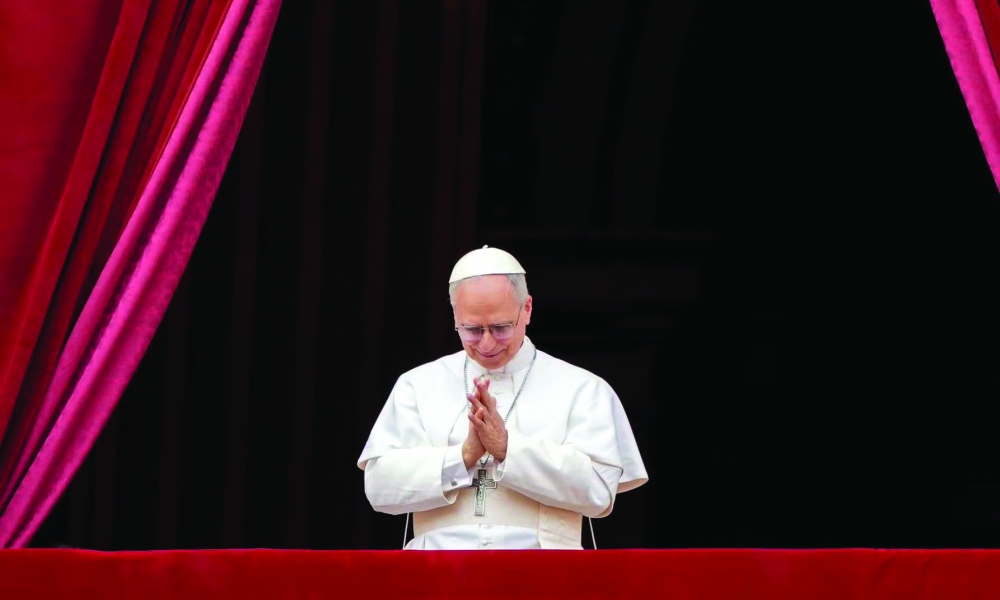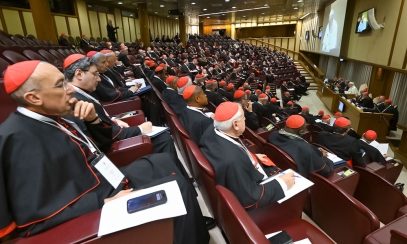
Pope Leo’s First Apostolic Exhortation: Dilexi Te
Pope Leo XIV’s highly anticipated first apostolic exhortation, Dilexi Te (On Love for the Poor), was officially promulgated on the Memorial of St. Francis of Assisi, Oct. 4, 2025, and was released in English on Oct. 9. Often seen as a bellwether of the developing pastoral priorities of the new pontiff, here, Pope Leo calls all Christians to recognize that care for the poor is “the burning heart of the Church’s mission.” (DT 15)
Pope Leo XIV’s highly anticipated first apostolic exhortation, Dilexi Te (On Love for the Poor), was officially promulgated on the Memorial of St. Francis of Assisi, Oct. 4, 2025, and was released in English on Oct. 9. Often seen as a bellwether of the developing pastoral priorities of the new pontiff, here, Pope Leo calls all Christians to recognize that care for the poor is “the burning heart of the Church’s mission.” (DT 15)
The work of two popes
As with Lumen Fidei (an encyclical co-authored by Pope Benedict XVI and Pope Francis), Dilexi Te includes the writings of two popes: Francis and Leo. Francis began writing this letter before his passing in April 2025 and Pope Leo completed the letter, adding some reflections of his own.
Notably, the letter draws upon the experiences and perspectives of its two authors. With Pope Francis previously serving as the Archbishop of Buenos Aires, Argentina, and with Pope Leo having served as a missionary in Peru during the 1980s and 1990s and later bishop of Chiclayo from 2015-23, the letter draws upon the rich theological reflection and social teaching found in the documents of the Conferences of Latin American Bishops. Acknowledging this profound influence, Pope Leo speaks to the Latin American Church’s “strong sense of the … need to identify with the poor” and advocate for their needs. (DT 89) With Dilexi Te, Leo is extending this same pastoral vision to the wider Church.
“A Church that sets no limits to love, that knows no enemies to fight but only men and women to love, is the Church that the world needs today.”
-DT 120
Major themes
God’s preferential love for the poor
Dilexi Te is named after the opening words of the apostolic exhortation as it appears in Latin, meaning, “I have loved you.” It begins by recalling God’s preferential love for the poor, as it is revealed throughout the Scriptures, culminating in the Incarnation of Jesus. “Jesus identified himself ‘with the lowest ranks of society’ and … with his love poured out to the end … confirms the dignity of every human being, especially when ‘they are weak, scorned, or suffering.’” (DT 2) Seeing God’s complete love for and identification with the poor, we are called to imitate that love.
Encountering Christ in the poor
Another theme present throughout Dilexi Te is the idea that the poor themselves mediate the very presence of Christ. In the Gospels, we see clearly that Jesus identifies with the poor: “‘Just as you did it to one of the least of these brothers and sisters of mine, you did it to me’ (Mt 25:40) … Contact with those who are lowly and powerless is a fundamental way of encountering the Lord of history. In the poor, he continues to speak to us.” (DT 5) Quoting St. Augustine (founder of Pope Leo’s Augustinian Order), the Holy Father writes, “For Augustine, the poor are not just people to be helped, but the sacramental presence of Christ.” (DT 44)
The center of the Church’s mission
Dilexi Te includes numerous paragraphs recalling myriad saints who bore witness to the Gospel through their care for the poor. Speaking about this, Pope Leo writes, “I have chosen to recall the age-old history of the Church’s care for the poor and with the poor in order to make clear that it has always been a central part of her life.” (DT 103) “The Church, to be faithful to her vocation, must not only share the condition of the poor, but also stand at their side and work actively for their integral development.” (DT 90) This call to raise our voices and to care for the poor is “a mandate that every Christian must daily take to heart.” (DT 107)
True worship
Dilexi Te reminds us that we cannot authentically worship God while neglecting the poor. God, “the friend and liberator of the poor … exhorts Israel to renew its worship from within, because one cannot pray and offer sacrifice while oppressing the weakest and poorest.” (DT 17) Jesus’ teaching shows that “one cannot love God without extending love to the poor. Love for our neighbor is proof of the authenticity of our love for God.” (DT 26) Quoting a homily from St. John Chrysostom, we read: “Do not honor Christ’s body here in church with silk fabrics, while outside you neglect it when it suffers from cold and nakedness. … Feed the hungry first, and only afterward adorn the altar with what remains.” (DT 41) Therefore it follows that “charity is not optional but is a requirement of true worship.” (DT 42)
A call to conversion and renewal
Dilexi Te is a call to conversion. Far too often, Leo laments, it “becomes normal to ignore the poor and live as if they do not exist.” (DT 93) Quoting Pope Francis’ reflection on the Good Samaritan in Fratelli Tutti, we read, “Let us admit that, for all the progress we have made … we have become accustomed to looking the other way, passing by, and ignoring situations until they affect us directly.” (DT 105) This tendency, he says, is not only found in society, “but also in our Christian communities.” (DT 107) For this reason, “Spiritual conversion [is] required of everyone.” (DT 98) “I am convinced,” Pope Leo writes, “that the preferential choice for the poor is a source of extraordinary renewal both for the Church and for society, if we can only set ourselves free from our self-centeredness and open our ears to their cry.” (DT 7)
“A Church that sets no limits to love, that knows no enemies to fight but only men and women to love, is the Church that the world needs today.”
-DT 120


